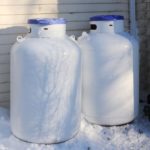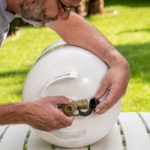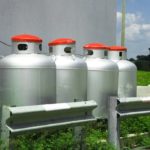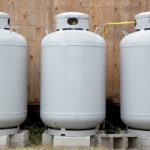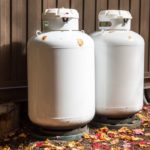When the winter season is around the corner, you may be concerned about how your propane tanks will put up with the winter weather. Cold temperatures can indeed cause low pressure in the tank, which can result in the tank being unable to function. This mishap should be avoided in extreme weather at all costs. But will propane tanks explode from getting too cold?
Propane tanks can withstand very cold temperatures and are very unlikely to explode from the cold. Keeping a tank relatively warm and at least 30% full is best practice. Keep your tank easily accessible and clear away any snow or ice that accumulates on your propane tank.
The coldest days are also the ones where you really don’t want to lose heating, so you certainly want to make sure your propane tank is safe and in working order. Let’s take a look at how to care for you tank through the winter so that you can rest easy and stay warm.
Do Propane Tanks Explode if They Get Too Cold?

Propane tanks are a vital item for many people around the world. But these tanks are sensitive to colder environments. Propane tanks should be handled with care and responsibility to avoid explosions or other hazardous situations.
Instead of exploding in low temperatures, propane tanks are more likely to just stop working. This will deem the tank absolutely useless. To understand this better, one needs to be familiar with the two ways a propane tank can have a negative impact on its surroundings and prove to be harmful.
Propane depletion and a loss of tank pressure are most likely to occur during colder days. When propane depletes inside the tank, it’s unable to carry out its usual tasks and usually requires a refill, which can be time consuming.
Propane reduction is caused due to a significant drop in temperature. Tank pressure also decreases during colder weather, causing the tank to lose its ability to convert liquid propane into its gaseous form.
In a nutshell, explosions are very unlikely to occur during winters. But if you’re looking to use a propane tank, checking on the tank’s pressure is very important. Maintaining a warm temperature around the vicinity of the tank can also help you to avoid any mishaps.
How to Keep a Propane Tank Safe in the Cold
There are few ways by which propane tanks can be kept safe during cold weather. It’s crucial to keep your tank at least 30% full at all times when the temperature starts to drop. Another way to keep it safe is by using a warming blanket like the Powerblanket PBL20-20 (on Amazon). This blanket will help keep the tank above -44˚F, which is the tank’s cold limit.
You can also choose to bury a propane tank in order to keep it warm and safe at all times. Using a smaller, insulated frame shelter for a propane tank is another effective method to protect it.
Moreover, finding any area where the temperature can be maintained above -44˚ F is your best bet. The more it’s exposed to the cold, the higher chances it has of exploding or being unable to function at all.
It’s also necessary to have a measuring device to check how full the tank is. This can help you refill before it goes on to deteriorate more.
How Do I Keep Propane Tanks Safe in the Snow?

Snowy weather can be a great concern when you own a propane tank. However, propane is unlikely to freeze inside the tank even though it will contract eventually, and this should be avoided. Letting snow build up on your tank is a mistake you can’t afford to make. It’s important to clear it so sunlight can reach the tank and keep it warm and danger-free.
Keeping a tank safe in the snow also involves checking on the tank and how full it is. If it’s at least 30% filled, the pressure inside the tank can remain intact. If these measures are not taken, the tank will be unable to supply propane to your burner. This mishap can lead to the temperature of the house dropping in extreme weather.
Avoiding moisture building up in the tank can also help you keep it safe in the snow. Draining water if any moisture forms can help in this situation. If moisture and water are kept away from the propane tank, it’s more likely to remain safe in the snow.
Other Ways to Help Keep the Propane Tank From Getting too Cold
There are many methods to keep a propane tank from getting too cold, but they require time and effort. A propane tank will stop functioning or won’t be safe to run if it gets too cold. One should always ensure that snow is taken away from your tank as quickly as possible. Keeping the regulator free of any snow or ice can help as well.
To keep the tank from getting too cold, you can also decrease the temperature in your house when the weather is better or consumption is low. But it’s necessary to keep the regulator free of snow and ice too. Giving the tank a break can provide the tank with extra time to build the pressure back up again.
Additionally, placing a flag or a pole that stands tall can help you identify your tank even in heavy snow. This will give you a chance to clear your tank off right away and keep it protected from the effects of extreme snow.

